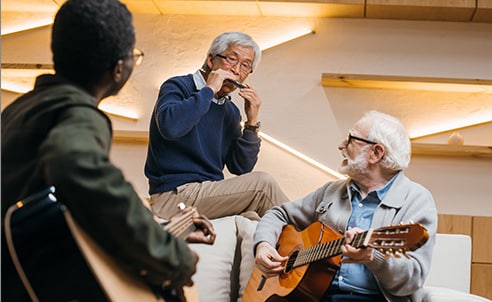
When we talk about “music therapy” in senior living, it might evoke gentle songs or a piano in the lobby. But the impact runs much deeper. For older adults, engaging with music can stimulate memory, foster social connection, boost mood, and support overall well‑being.
At Avanti Senior Living, we see music not just as entertainment—it is a tool that helps people stay engaged, confident, and connected with others.
Why Music Matters as We Age
Aging doesn’t mean withdrawing from life. It means living in new ways—with continued meaning, growth and connection. Research shows that participating in music‑based activities can spark neural pathways tied to memory and emotion. Music links to places, people and feelings. It serves as a bridge between past experiences and present moments.
When older adults take part in group music experiences—singing, playing instruments, listening with others—they often show improved mood, better social engagement, and clearer memory recall.

Music has the unique ability to evoke joy, ease stress, reduce anxiety and lift spirits.
The Many Benefits of Music Therapy
Enhancing Memory and Cognitive Function
When older adults engage with familiar songs or rhythms, the brain often lights up in regions tied to memory, language and emotion. With guided music‑therapy sessions, residents recall lyrics, share stories associated with a tune, and connect notes to life events. That kind of recall strengthens memory networks and helps maintain cognitive sharpness.
Improving Mood and Emotional Well‑Being
Music has the unique ability to evoke joy, ease stress, reduce anxiety and lift spirits. For someone transitioning into a community‑based living environment, these emotional benefits matter. Group music sessions create moments of celebration, laughter and shared resilience.
Building Social Connection
Music therapy is rarely solo. It happens in groups, pairs or with a facilitator. These shared experiences reinforce belonging, spark conversations and reduce feelings of isolation. At Avanti, residents meet often for ensemble sessions, choir‑style gatherings or simply enjoying live music together.
Supporting Purpose and Expression
Older adults bring a lifetime of musical influences, favorite songs and lived experience. Music therapy gives them a chance to share that legacy—singing a childhood tune, playing an instrument for the first time or joining a band just for fun. That expression strengthens identity and fosters meaning.
Tips for Families and Caregivers
If you support a loved one who lives at home or is considering community living, here are some ideas to extend the benefits of music therapy beyond scheduled sessions:
- Ask about playlists: What songs did they love when they were younger? Build a playlist together and play it during meals or quiet time.
- Encourage improvisation: A small drum, shaker or keyboard at home invites spontaneous participation and brings energy.
- Make it social: Invite friends or family for a “music hour” at home—singing, recalling songs, dancing if possible.
- Combine memory prompts: Use lyrics, photos and stories together—“Do you remember this song? What was happening when you first heard it?”
- Keep it positive and age‑respectful: Celebrate the person’s choice, ability and enjoyment rather than focusing on what they might be losing
Final Thoughts
Music therapy is more than a leisure activity. It’s a pathway to memory, mood, connection and purpose. When older adults participate in music, they reaffirm the value of their experience, keep their minds engaged and share joy with others.
At Avanti Senior Living, we believe that older adults deserve vibrant days filled with meaning, choice and connection. For those seeking a place where music becomes part of the life rhythm—and not just a background tune—Avanti provides that environment.

